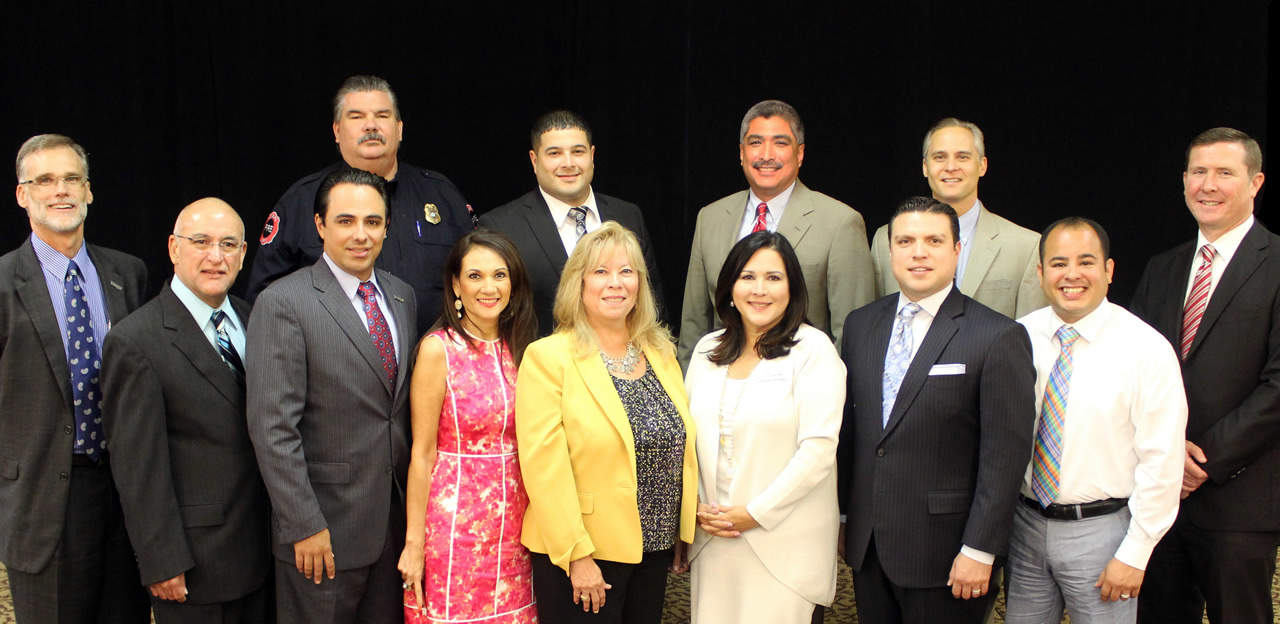Edinburg’s construction activities from January through July 2015 total $78.5 million, ahead of pace over same period in 2014, announces EEDC

Featured, from left: Agustín García, Jr., Executive Director, Edinburg Economic Development Corporation; Councilmember Richard Molina; Mark Iglesias, President, EEDC Board of Directors; and Mayor Richard García, Member, EEDC Board of Directors, in the Edinburg City Council Chambers at Edinburg City Hall on Wednesday, May 13, 2015.
Photograph By MARK MONTEMAYOR
The combined value of permits issued for construction and related building activities in Edinburg from January through July 2015 totaled more than $78 million, compared with almost $74 million during the same period last year, the Edinburg Economic Development Corporation has announced. A building permit includes the estimated value of the work, but does not include the price of the lot. In general, a building permit is legal permission given by the City of Edinburg to erect, construct, renovate, maintain, or conduct any other specified activity on any building or structure, or on any installations or facilities therein. The term “building permit” includes but is not limited to building permits, electrical permits, mechanical permits, and plumbing permits. The EEDC, of which Agustín García, Jr. is Executive Director, is the jobs-creation arm of the Edinburg Mayor and Edinburg City Council. The EEDC Board of Directors is comprised of Mark Iglesias as President, Harvey Rodríguez as Vice President, Ellie M. Torres as Secretary/Treasurer, and Mayor Richard García and Richard Rupert as Members. The latest figures do not include the more than $107 million for new construction projects, approved by the University of Texas System Board of Regents, which are scheduled to begin this year or which have been authorized this year. UT-RGV, formerly known as UT-Pan American, is a state entity, so the city does not issue building permits or include the value of any construction at the university campus in the data put together by Edinburg’s Code Enforcement Department. “On Thursday, May 14, the UT System Board of Regents gave final permission for the release of funding and of design development for a $70 million, 115,000-square-foot addition to the Science Building at UT-RGV in Edinburg, and that facility, which will be the largest on campus, is set to begin construction this December,” said Mayor García. “A few weeks ago, on Wednesday, August 19, the UT System Board of Regents agreed to begin the process that will lead to the construction of a $37.6 million, 77,000-square-foot Interdisciplinary Engineering and Academic Studies Building for the Edinburg campus.” In addition, the UT System Board of Regents on August 19 gave the go-ahead for UT System officials to negotiate the purchase of 53 acres, located at the southeast quadrant of North Sugar Road and West Chapin Street in Edinburg, from Norquest Family Holdings, Ltd., for “future campus expansion”, the mayor noted. EEDC Board President Iglesias said the Edinburg City Council and the EEDC Board of Directors continue to significantly influence the growth of the local economy with their legislative and public policy strategies, such as lobbying the UT System Board of Regents and the Texas Legislature for more state resources for UT-RGV and the UT-RGV School of Medicine in Edinburg. “The EEDC Board of Directors, the Mayor and City Council work as partners, not only with each other, but with our legislative delegations in Austin and Washington, D.C., with our business and community leaders in our city, and especially with our citizens to set high goals and surpass them,” said Iglesias. “With more economic prosperity and investments, such as these incredible advances in higher education, we will continue to see key growth in construction of homes and businesses in Edinburg.” EEDC Executive Director Agustín García, Jr. (no relation to the mayor), said part of Edinburg’s successes is the determination of the elected and appointed leadership in the community to shape state and national policies, on their own or with other regional and statewide groups, for the benefit of the local economy. “Border security, health care, immigration, job creation, they are all important for the city’s prosperity and quality-of-life, and wherever the decisions on such issues are being made that affect us, from the county courthouse to the state and U.S. capitols, we make sure that we are part of the solution,” said the EEDC Executive Director. “That vision and direction come from the EEDC Board of Directors, the Mayor and the Edinburg City Council, who consult with our citizens, and we see the fruits of their labor throughout Edinburg.” From January through July 2015, building permits valued at $78,554,684 were issued by the city, compared with $73,830,585 for the same period in 2014. The top categories in Edinburg from January to July 2015 were: $25,396,282 – Single-Family Residences New Construction; $22,062,622 – Non-Taxable New Alterations (government, religious, but not including UT-RGV) $12,258,728 – Commercial New Construction; $10,011,285 – Commercial Alterations; $4,909,356 – Multi-Family Residences New Construction; and $3,916,411 – Residential Alterations.
•••••• (more…)






















